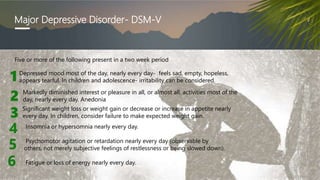

At a minimum, there would need to be field trials to determine prevalence, reliability, false positive, and false negative rates. The false positive problem is too unknown and potentially far too large to ignore. Once the genie is out of the bottle and DSM5 makes it easy to diagnose depression in grief situations, this could easily become an industry propelled fad diagnosis.Ĥ) The tightened criteria would help reduce, but certainly not eliminate, the grave potential harm caused by the massive misidentification of false positives.įalse positives and excessive treatment are not be a problem for skilled and cautious clinicians (like Pies and Zisook), but in the real world most of the prescriptions will be written by primary care physicians who have six minutes with each patient, don't know the fine points of the criteria sets, and want the fastest solution. The argument that we should just go to where the science takes us ignores that the science is (as they point out) not definitive, is subject to different interpretations, and is not readily generalizable from research to real world settings.

All potential risks have to be thought thru and factored into a thorough risk/benefit analysis.
#Depression dsm 5 manual#
All decisions for DSM5 should follow the injunction-"First Do No Harm."Although it is impossible to predict precisely how any DSM5 change will eventually play out once the manual is in general use, that doesn't reduce DSM's responsibility for the problems that occur, even if they are unintended.

3) My disagreement with Pies and Ziskind is strongest on this point. Cultural biases would be very hard to surmount in making this diagnosis. It would be unfortunate for psychiatry to prematurely roam into problems usually better handled by family and other cultural institutions. This explains why grief is the universal target of communal healing rituals. Here are the opposing points:ġ) Re clinical need: In appropriate cases displaying clinically significant impairment, distress, or risk, the diagnosis Depression Not Otherwise Specified covers their false negative problem.Ģ)I believe there is a difference between losing a loved one and most other life stressors. Though I continue to disagree with the Pies/Ziskind proposal, it is reasonable and deserves serious consideration. If the individual previously had severe grief symptoms, but recovered spontaneously (without going on to a major depression), this would suggest they are now grieving their own way and do not require diagnosis or treatment.ĭSM5 has made many poorly thought through suggestions that can be fairly easily dismissed. The entire package differentiating grief from depression would require:Ģ)A particularly severe presentation that includes some combination of unreasonable guilt, worthlessness, hopelessness, self loathing, anhedonia, a focus on negative memories of the departed, alienation from others, and inability to be consoled.ģ)To recognize the different cultural expressions, the diagnosis of depression would not be made if the person's grief is within cultural norms.Ĥ)An exclusion could be added that would take into account the person's own past experience of grief and its previous outcomes. The excellent proposal made by Pies/Ziskind to reduce false positives could be strengthened even further if two additional exclusions were added to the two(#'s 1and 2 below) that they suggested. The longer that diagnosis and treatment are delayed, the greater their suffering, impairment, and risks (eg job loss, injured relationships, lowered treatment response, suicide).Ģ)The loss of a loved one is not essentially different from the many other serious stressors that abound in life.ģ)It is impossible to predict the future misuse of the DSM5 system so we should make decisions based only on the best possible science.Ĥ) The criteria for complicated grief could be tightened to reduce false positives.( They suggest two useful ways described below and I add two others).ĥ) Education can solve the problem of false positive diagnosis and the risk of providing medicine in milder cases when time, support, and/or psychotherapy would be more indicated. They cite several lines of argument:ġ)There is a clinical need- some individuals have severe, complicated grief that looks just like severe Major Depression and does not get better spontaneously. Pies and Ziskind (in a recent commentary in Psychiatric Times) have gone far beyond the meager DSM5 rationale to present the strongest possible case for allowing the diagnosis of Major Depression in grief situations.


 0 kommentar(er)
0 kommentar(er)
